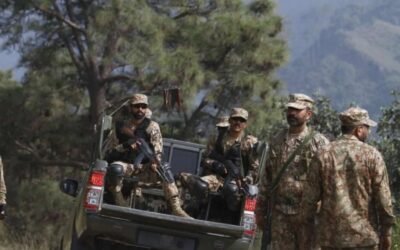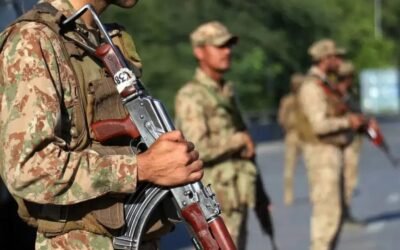Balochistan is the hotbed of insecurity and political instability in Pakistan. The province is experiencing a combination of ethnic separatism, religious extremism, and criminal groups that often target state facilities, infrastructure, and the population. Even after several years of military operations and intelligence-led operations, militant groups have continued to have the capability of carrying out high impact attacks and in most cases, they take the advantage of loopholes in law enforcement and governance in the region.
Khuzdar in southern Balochistan has been vulnerable owing to the mountainous terrain, lack of security infrastructure and nearness to the insurgent strongholds. People in these regions are usually sandwiched between militants and the state, and they experience direct violence and displacement.
In May 2025, a school bus full of children in Khuzdar district of Balochistan became a target of a remote-controlled bomb. The blast killed six individuals and left 53 others injured with many of them being students going to school.

Source: Al Jazeera
The assault shocked the entire Pakistan when the heartbreaking scenes of injured children and devastated families appeared. The local officials affirmed that the device was placed by the roadside and later exploded as the bus went through a crowded area.
The wounded were taken to the hospitals nearby, and the emergency staff worked under pressure trying to save lives. No organization has so far taken responsibility but the area has been a long time battling with separatist violence and insurgent attacks.
This accident once again marked the most vulnerable group to the continued conflict in Balochistan, which is the civilian population, more particularly children.
The attack was heavily condemned by political leaders in Pakistan. Prime Minister`s Office issued a statement condemning the act and said it was extremely sad and the state was determined to eradicate terrorism. Rights activists and civil society organizations called on justice and improved security of civilians particularly children in conflict prone regions.
The provincial government declared emergency responses and compensation to the victims, but the people were very angry because of the constant security breakdowns in the area. Citizens took to social media where hashtags were trending with anger, grief and solidarity.
In some cities, including Quetta, Karachi, and Islamabad, candle light vigils were organized in memory of the victims and in demand of peace in Balochistan. The outpouring was a sign of a country in grief and people fed up with rhetoric and no action on the ground.
UN Security Council Denunciation:
To react to the tragic attack in Khuzdar, the United Nations Security Council (UNSC) made a strong condemnation underlining the seriousness of attacking civilians especially children in armed violence.

Source: Dawn
In a press statement, the UNSC took serious note of the increased number of terrorist attacks on non-combatants in Pakistan and indicated that such acts are unjustifiable no matter the motive. The Council demanded that the perpetrators be brought to justice and that international humanitarian law ought to be followed and that it is against the international humanitarian law to intentionally attack civilians, more so, minors.
The UN also reinforced its support towards the fight against terrorism in Pakistan and urged the enhancement of national and regional systems to guarantee the security of schools and the transport system.
Specifically, the Council emphasized that children should never be the objects of the conflict and that violence should not be used to threaten education. Permanent members as well as non-permanent members supported the statement, which was a rare occasion of agreement on humanitarian issues.
The Pakistani representative at the UN hailed the statement and reiterated the commitment of his country to eliminate terrorism, but also called on the global community to take cognizance of the cause of extremism in the world and help to find solutions to the same through peace building efforts in war torn regions such as Balochistan.
Such international denunciation brought in a moral pressure on the insurgents to ensure protection of the civilians and strive to find a long-term solution to the instability in the region.
Implications
Such attacks instill fear, which pushes parents to keep their children out of school –which damages education and the cycle of poverty and isolation in already disadvantaged communities. Besides, the fact that the civilians were targeted repeatedly demonstrates the serious failure in intelligence coordination and preventative action.
Such attacks still occur despite the presence of larger security budgets and military in the province, and this makes people raise concerns regarding the success of the state counterterrorism strategy. It is also increasingly worrying how these events are being used by the extremists to build on their narratives, creating more distrust between the state and the local communities. The space of radicalization expands when individuals feel vulnerable or victimized in counter-insurgency efforts.
The attack is also a problem for Pakistan on the international front. Violence in Balochistan has been a constant spoiler to investor confidence as the country tries to attract investment, particularly under the China-Pakistan Economic Corridor (CPEC), which has complicated diplomatic relations.
The repeated targeting of soft targets is also likely to draw the international condemnation of not only the human rights fraternity, but also the strategic partners of Pakistan, who would demand stability as a precondition to further engagement. Unless these related problems are addressed, then there is a likelihood that these attacks will persist and the most affected will be children and other vulnerable groups.
International and Regional Responses
The Khuzdar school bus bombing was heavily condemned by the United Nations as well as some countries and international organizations. The neighboring countries such as Iran and China lamented the death of innocent people and pledged their support to the war on terrorism on the part of Pakistan.
The Foreign Ministry of China also pointed out the need to enhance regional cooperation against terrorism, especially as there is a continuation of cooperative efforts in the region through CPEC, many of which go through Balochistan.
Human rights groups like Amnesty International and Human Rights Watch cried foul when the civilians in the restive regions of Pakistan became the targets of repeated attacks. These organizations called on the Pakistani government to give priority to safeguarding human rights, investigations should be impartial, and the indiscriminate counter-terror actions should not be allowed, which would further alienate the local populations.
They emphasized that it is necessary to comply with the Safe Schools Declaration, an international promise that Pakistan has joined, the implementation of which involves protecting education in conflict areas.
This wide global interest shows the international aspect of the internal conflicts in Pakistan. It is also an indication that there is an increasing realization that the stability of Balochistan is not just a domestic concern but a regional and global security issue in particular in the age of transnational threats and geopolitical competition.
The Way Ahead
The Khuzdar school bus attack has once again demonstrated –why Pakistan needs to have a multi-pronged and people-centered approach to stem such tragedies in the future. Among the most critical steps, it is necessary to enhance the security of civilian areas especially schools, buses, and hospitals with better intelligence exchange, early warning systems, and community policing.
The government should also invest in mental support of victims. When not addressed, trauma among children and youth may act as a source of generational fear, resentment and even radicalization in the future. Rebuilding trust between the local and the state is critical through programs.
This involves engaging the local elders, teachers and the civil society in decision making and peacebuilding. Alienation will be alleviated by a more open manner of dealing with counterterrorism, whereby excesses are held to account and human rights are respected.
At the same time, education should be safeguarded and encouraged. The state should re-commit to the Safe Schools Declaration by making concrete actions such as ensuring school transport, emergency training of staff, and access to safe learning places. Inclusion of local employment, social investment, and engagement with historically disenfranchised communities needs to be a part and parcel of development projects in Balochistan particularly under CPEC.




























